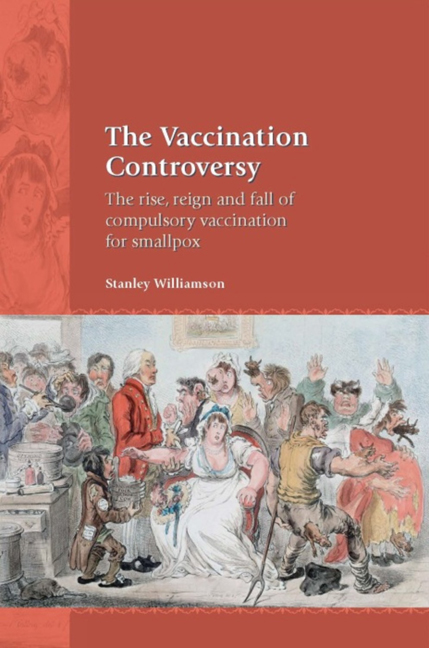Book contents
- Frontmatter
- Dedication
- Epigraph
- Contents
- Acknowledgements
- Part I The Road to Compulsion
- 1 The Byzantine Operation
- 2 The Small Pockes
- 3 The Engrafted Distemper
- 4 The Language of Figures
- 5 The Suttonian System
- 6 The Great Benefactor
- 7 The Speckled Monster
- 8 The Three Bashaws
- 9 A Competent and Energetic Officer
- 10 Formidable Men
- 11 The Present Non-System
- 12 Toties Quoties
- 13 Crotchety People
- Part II The Reign of Compulsion
- Part III The Retreat from Compulsion
- Notes
- Bibliography
- Index
7 - The Speckled Monster
from Part I - The Road to Compulsion
- Frontmatter
- Dedication
- Epigraph
- Contents
- Acknowledgements
- Part I The Road to Compulsion
- 1 The Byzantine Operation
- 2 The Small Pockes
- 3 The Engrafted Distemper
- 4 The Language of Figures
- 5 The Suttonian System
- 6 The Great Benefactor
- 7 The Speckled Monster
- 8 The Three Bashaws
- 9 A Competent and Energetic Officer
- 10 Formidable Men
- 11 The Present Non-System
- 12 Toties Quoties
- 13 Crotchety People
- Part II The Reign of Compulsion
- Part III The Retreat from Compulsion
- Notes
- Bibliography
- Index
Summary
After the great surge of smallpox during the last quarter of the eighteenth century the disease relaxed its grip somewhat in the earlier years of the nineteenth, and the efforts of the medical profession were directed largely to weaning the lower classes away from variolation and selling them vaccination. The task was not easy; as Baron commented, the adoption by so many reputable medical men of vaccination left the field clear for the more unscrupulous practitioners who ‘took up the small-pox lancet and disseminated the disease in a very frightful manner’.
The profession did its best to fight back. In 1805 the Medical Council of the Royal Jennerian Society appointed a committee of 25 members to investigate cases that had excited prejudices against vaccination and also the ‘evidence respecting instances of small-pox alleged to have occurred twice in the same person’. The committee found that most of the alleged failures were ‘either wholly unfounded or greatly misrepresented’; that ‘nothwithstanding the most incontestable proofs of such misrepresentations, a few medical men have persisted in repeatedly bringing the same unfounded reports […] before the public; then perversely and disingenuously labouring to excite prejudices against vaccination’; that ‘many persons have been declared duly vaccinated, when the operation was performed in a very negligent and unskilful manner’; that ‘the Medical Council are fully convinced that the failure of vaccination as a preventive of the small-pox, is a very rare occurrence’; that ‘a few instances of failure either in the inoculation of the cow-pox as of the small-pox, ought not to be considered as objections to either practice, but merely as deviations from the usual course of nature’; that ‘it appears to the Medical Council that the cow-pox is generally mild and harmless in its effects’; with much more in the same vein, concluding with a solemn Declaration, signed by 50 members of the Medical Council:
That, in their opinion […] mankind have already derived great and incalculable benefit from the discovery of vaccination: and it is their full belief that the sanguine expectations of advantage, and security, which have been formed from the inoculation of the cow-pox, will be ultimately and completely fulfilled.
- Type
- Chapter
- Information
- The Vaccination ControversyThe Rise, Reign and Fall of Compulsory Vaccination for Smallpox, pp. 98 - 106Publisher: Liverpool University PressPrint publication year: 2007



